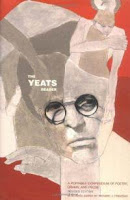Yeats on Blake on the Imagination
 The project outlined in Desiring the Kingdom has a tenuous relationship to romanticism. On the one hand, while I accord a central role to the imagination, I spend time trying to emphasize that this is not the “inventive” imagination of the romantics; instead it is a receptive, constituting imagination–a mode of intentionality on a different register. (William Desmond is quite helpful on this point.)
The project outlined in Desiring the Kingdom has a tenuous relationship to romanticism. On the one hand, while I accord a central role to the imagination, I spend time trying to emphasize that this is not the “inventive” imagination of the romantics; instead it is a receptive, constituting imagination–a mode of intentionality on a different register. (William Desmond is quite helpful on this point.)
There have been men who loved the future like a mistress, and the future mixed her breath into their breath and shook her hair about them, and hid them from the understanding of their times. William Blake was one of these men, and if he spoke confusedly and obscurely it was because he spoke things for whose speaking he could find no models in the world about him. He announced the religion of art, of which no man dreamed in the world about him; and he understood it more perfectly than the thousands of subtle spirits who have received its baptism in the world about us, because, in the beginning of important things–in the beginning of love, in the beginning of the day, in the beginning of any work, there is a moment when are understand more perfectly than we understand again until all is finished. In his time educated people believed that they amused themselves with books of imagination but that they ‘made their souls’ by listening to sermons and by doing or by not doing certain things. When they had to explain why serious people like themselves honoured the great poets greatly they were hard put to it for lack of good reasons. In our time we are agreed that we ‘make our souls’ out of some one of the great poets of ancient times, or out of Shelley or Wordsworth, or Goethe or Balzac, or Flaubert, or Count Tolstoy, in the books he wrote before he became a prophet and fell into a lesser order, or out of Mr. Whistler’s pictures, while we amuse ourselves, or, at best, make a poorer sort of soul, by listening to sermons or by doing or by not doing certain things. We write of great writers, even of writers whose beauty would once have seemed an unholy beauty, with rapt sentences like those our fathers kept for the beatitudes and mysteries of the Church; and no matter what we believe with our lips, we believe with our hearts that beautiful things, as Browning said in his one prose essay that was not in verse, have ‘lain burningly on the Divine hand,’ and that when time has begun to wither, the Divine hand will fall heavily on bad taste and vulgarity. When no man believed these things William Blake believed them, and began that preaching against the Philistine, which is as the preaching of the Middle Ages against the Saracen.
He had learned from Jacob Boehme and from old alchemist writers that imagination was the first emanation of divinity, ‘the body of God,’ ‘the Divine members,’ and he drew the deduction, which they did not draw, that the imaginative arts were therefore the greatest of Divine revelations, and that the sympathy with all living things, sinful and righteous alike, which the imaginative arts awaken, is that forgiveness of sins commanded by Christ. The reason, and by the reason he meant deductions from the observations of the senses, binds us to mortality because it binds us to the senses, and divides us from each other by showing us our clashing interests; but imagination divides us from mortality by the immortality of beauty, and binds us to each other by opening the secret doors of all hearts. He cried again and again that every thing that lives is holy, and that nothing is unholy except things that do not live–lethargies, and cruelties, and timidities, and that denial of imagination which is the root they grew from in old times. Passions, because most living, are most holy–and this was a scandalous paradox in his time–and man shall enter eternity borne upon their wings.



